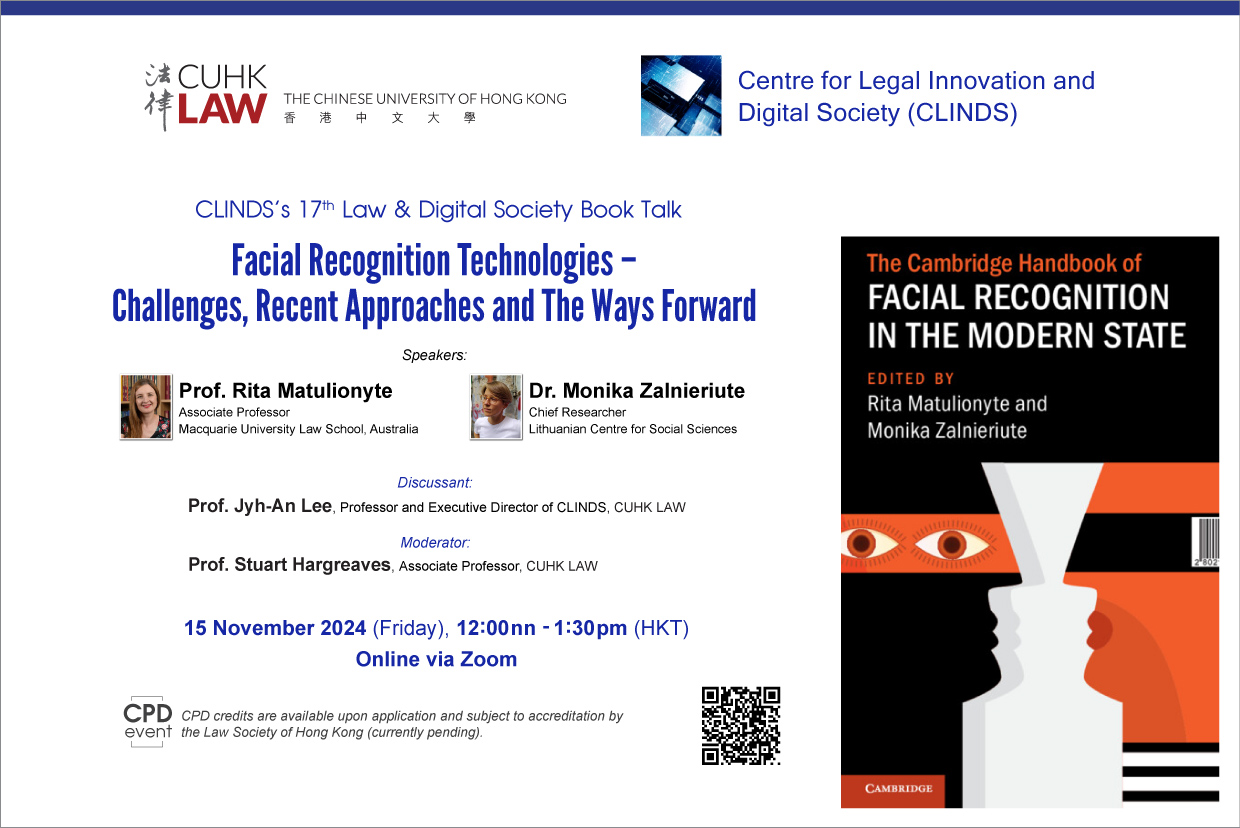Events
CUHK LAW CLINDS's 17th Law & Digital Society Book Talk – ‘Facial Recognition Technologies – Challenges, Recent Approaches and The Ways Forward’ (Online)
15 Nov 2024
12:00 nn – 1:30 pm (HKT)
Online via Zoom
Prof. Rita Matulionyte is an Associate Professor at Macquarie University Law School (Australia) and an international expert in intellectual property and technology law, with her most recent research focusing on legal and governance issues surrounding Artificial Intelligence technologies. Rita has over 60 research papers published by leading international publishers and she has been invited to present her research in conferences in Europe, Asia, Latin America and Australia. She is a recipient of Women in AI Award 2023 APAC, in AI in Law category, and has co-authored commissioned reports for the European Patent Office, the governments of Australia, South Korea and Lithuania. Rita is serving as an expert at the Australia Government’s Copyright and AI Reference Group (CAIRG), an expert at the International Standards Organization/Standards Australia IT-043 Committee on Artificial Intelligence, is an Executive Member of Macquarie University Ethics and Agency Research Centre, and is an active member of the Australian Alliance for AI in Healthcare, Safety and Ethics Working Group.
Dr. Monika Zalnieriute is a Chief Researcher at the Lithuanian Centre for Social Sciences. She has just completed Australian Research Council DECRA project “AI-Decision Making, Privacy and Discrimination Laws” (2021-2024) and returned to Lithuania from UNSW Sydney, where she has spent last 6 years. Monika’s research on law and technology has been published widely by leading international journals, such as the Modern Law Review and American Journal of International Law. Her research has been drawn upon widely by scholars (800+ citations on Google Scholar; and 18000+ downloads on SSRN) and international organizations, such as the Council of Europe, World Bank, the European Parliament and WHO. Her work has been translated into Mandarin, Russian and German, and has also appeared in international media outlets, such as BBC and The Guardian. Monika is the co-editor of Money Power and AI (Cambridge University Press, 2023) and The Cambridge Handbook of Facial Recognition in the Modern State (Cambridge University Press, 2024). She is a keen long-distance runner and has finished her first marathon last year.
Discussant:
Jyh-An Lee is a Professor and the Executive Director of the Centre for Legal Innovation and Digital Society (CLINDS) at the Chinese University of Hong Kong (CUHK) Faculty of Law. He has been a faculty member of the CUHK EMBA program since 2018. Professor Lee also coaches the New Ventures Legal Team (NVLT), a clinical support group collaborating with CUHK’s Pre-Incubation Centre for startup companies. He was the LLB Programme Director and Assistant Dean for Undergraduate Studies at CUHK Faculty of Law from 2019 to 2021.
Professor Lee holds a JSD from Stanford Law School and an LLM from Harvard Law School. He has published on various aspects of intellectual property and internet law in such academic journals as the Wake Forest Law Review, American Business Law Journal, Columbia Journal of Law & the Arts, Duke Law & Technology Review, Virginia Journal of International Law, Michigan Technology Law Review, Vanderbilt Journal of Entertainment & Technology Law, Vanderbilt Journal of Transnational Law, Minnesota Journal of Law, Science & Technology, Jurimetrics, European Intellectual Property Review (EIPR), and Computer Law & Security Review. His authored and edited books are Nonprofit Organizations and the Intellectual Commons (Edward Elgar, 2012), Intellectual Property Law in China (Wolters Kluwer, 2nd ed., 2021, co-authored with Peter Ganea, Danny Friedmann, and Douglas Clark), and Artificial Intelligence and Intellectual Property (Oxford University Press, 2021, co-edited with Reto M. Hilty and Kung-Chung Liu).
Before starting his academic career, he was a practicing lawyer in Taiwan, specializing in technology and business transactions. During his studies at Stanford Law School, he was a John M. Olin Fellow in Law and Economics. Prior to joining the Chinese University of Hong Kong, he taught at National Chengchi University and was an Associate Research Fellow at the Research Center for Information Technology Innovation at Academia Sinica in Taiwan. He was the Legal Lead and Co-Lead of Creative Commons Taiwan (2011–2014). He also lent his expertise as an advisory committee member for Copyright Amendment at the Taiwan Intellectual Property Office (TIPO), which operates under the Ministry of Economic Affairs, during the same period. Professor Lee has been the legal lead of the Creative Commons Hong Kong Chapter since October 2018. He is currently an advisory-board member serving the European Center for E-Commerce & Internet Law advisory board, which is affiliated with the University of Vienna. Since 2016, he has held a panelist position for the Asian Domain Name Dispute Resolution Centre (ADNDRC).
Professor Lee has been featured on ABC News, BBC News, Bloomberg News, Financial Times, Fortune, and South China Morning Post as an expert on intellectual property and Internet law. His works have been cited by the US Court of Appeals for the Fifth Circuit, the UK High Court of Justice, the US International Trade Commission, and the European Union (in a WTO dispute-settlement case).
https://cloud.itsc.cuhk.edu.hk/webform/view.php?id=13696033
Registration Deadline: 12:00 nn (HKT), 14 November 2024
The use of Facial recognition technologies has proliferated both in public and private sectors in countries around the world. While their proponents highlight the ability of these technologies to improve service delivery and ensure safety, the critics point to significant risks they create to privacy, non-discrimination and other fundamental rights. This presentation will introduce the Cambridge Handbook of Facial Recognition in the Modern State where 34 contributors from 5 world regions (Europe, US, Asia Pacific, North America and Latin America) discuss the legal and ethical challenges that these technologies raise, whether the existing legal frameworks in different countries are fit for purpose in addressing these challenges and what are the most recent and possible future efforts to regulate – and tame – these controversial tools.
Language: English
*CPD credits are available upon application and subject to accreditation by the Law Society of Hong Kong (currently pending).




